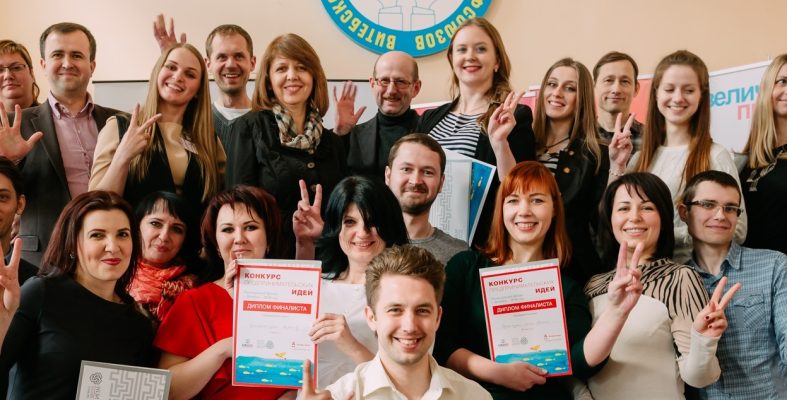Six years ago, born out of the necessity to more broadly reach entrepreneurs across Belarus, the USAID-funded Delivering Regional Instruction Vital to Entrepreneurial Success (DRIVES) program began a journey of technological and pedagogical innovation to expand access to virtual business education. As a result, today, the DRIVES program finds itself well-positioned to adapt to the disruption COVID-19 is causing to schools and universities around the globe.
Managed by Pyxera Global and implemented by one of Belarus’s only business universities, IPM Business School, the DRIVES program pioneered the country’s first full-fledged virtual learning platform. While the problem of access to business education in Belarus was evident—entrepreneurs and business owners outside Minsk were inhibited from studying in the capital city, where courses were offered, by the cost of travel, accommodation, and time away from work—the program team grappled with many of the same challenges and questions facing education institutions today. What are the technology requirements for operating an online platform? What training will educators need to be successful and confident in shifting from in-person to virtual teaching? How should course curricula and content be adapted to maintain high quality? How will students be able to participate and interact with each other?
From the program’s inception, DRIVES recognized that technology would be central to enabling business education to become accessible across Belarus. The team was aware of the tech-related challenges many universities in other countries had with online courses, frequently due to reliance on Wi-Fi networks with limited bandwidth and poor connectivity, making transmission of videos and live engagement challenging. To circumvent these problems, IPM Business School pioneered an innovative new approach to technology integration. The school created its own TV network and, through the initial USAID grant, invested in and installed advanced CISCO teleconferencing equipment in the program’s newly established business education centers in Minsk and five regional cities. The teleconference equipment, which connects all six locations, allows students to be physically located in any center together with other students, while interacting in real time with students and instructors in the other locations. During the program’s first year, IT specialists worked to ensure the technical requirements were met so that the live feed is crisp and clear, and the experience seamless.
The teleconference equipment, which connects all six locations, allows students to be physically located in any center together with other students, while interacting in real time with students and instructors in the other locations.

No matter how advanced the technology is, it is only functional if faculty is equipped with both the skills to operate the system and the pedagogy to teach courses in an online format—a style that was new to all IPM Business School educators. The DRIVES program’s experience has shown that providing support to faculty is essential for delivering high quality and engaging distance education. To familiarize faculty with online course delivery, the DRIVES program facilitates trainings with experts of instructional design. IPM’s instructors learn and practice how to adapt their course material and the structure of their lessons, communicate and present material clearly, and ensure that students participate actively and stay motivated throughout the learning process. Floria Volynskaya, distance learning pedagogy expert and former director of instructional design at the University of Maryland’s Robert H. School of Business, has been training IPM Business School faculty through the DRIVES program since 2014. She explained that, unlike her experience at many other universities, at IPM Business School “there is no barrier to entry or resistance from the faculty. They understand that the market drives innovation and that the market requires them to change.” Floria largely credits this motivation to the faculty’s success in her most recent training in Minsk last October. By the end of the one-week training, all of the participating IPM Business school faculty had designed the structure for a blended-learning curriculum (one that incorporates both online and in-person learning) for one of their courses—a process that Floria says typically takes six-to-eight months of development.
No matter how advanced the technology is, it is only functional if faculty is equipped with both the skills to operate the system and the pedagogy to teach courses in an online format.

DRIVES’ early innovations provide a strong foundation to quickly adapt to COVID-19
Because the USAID DRIVES program had built a strong technological and pedagogical foundation, so far COVID-19 is causing minimal disruption to IPM Business School’s course delivery. The faculty was able to move swiftly and within one week of the pandemic arriving in Belarus, all open courses had been fully adapted for virtual use, allowing entrepreneurs to connect to their sessions from home without disrupting the flow of learning. Thanks to the development of technological and online capabilities, DRIVES is formatting its in-person networking events for business and start-up owners to be held virtually. The program is also leveraging its network of businesses across the country to provide support and information to small business owners during the pandemic through webinars.
Inevitably, the pandemic will continue to inflict economic pain on Belarus. IPM Business School is not immune to the long-term economic fallout caused by COVID-19. However, DRIVES’ six years of learning and developing its virtual education system has enabled it to successfully adapt to new realities. The program’s experience provides useful insight for education communities seeking to design solutions to today’s challenges and opportunities.

This story is made possible by the support of the American people through the United States Agency for International Development (USAID) as part of the Delivering Regional Instruction Vital to Entrepreneurial Success project implemented by Pyxera Global. The contents of this document are the sole responsibility of Pyxera Global and do not necessarily reflect the views of USAID or the United States Government.

